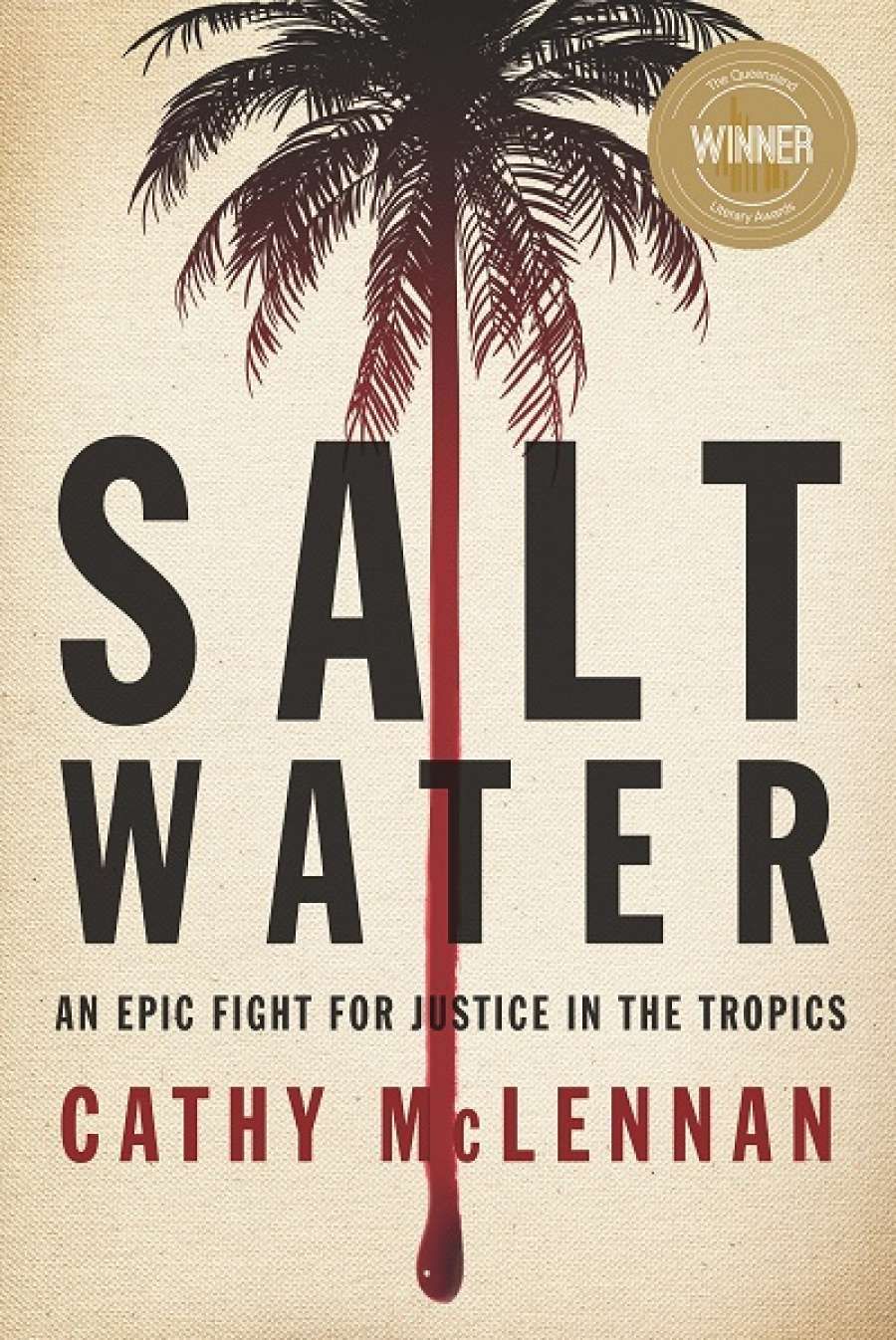
- Free Article: No
- Contents Category: Memoir
- Custom Article Title: Sue Bond reviews 'Saltwater' by Cathy McLennan
- Custom Highlight Text:
This book is likely to anger many readers. Saltwater is about Cathy McLennan’s time as a barrister for the Aboriginal and Torres Strait Islander Legal Service on Palm Island and ...
- Book 1 Title: Saltwater
- Book 1 Biblio: University of Queensland Press $32.95 pb, 328 pp, 9780702253836
There are two other young Aboriginal people, a girl of eleven called Olivia and a teenage would-be stand-up comic named Adam; McLennan also relates their poignant stories. Olivia has foetal-alcohol syndrome and is malnourished and abused; her mother, an alcoholic, was nearly killed by Olivia’s father. Adam, funny and good-hearted, looks after his friend Tim who has brain damage from a sporting accident, and lives with his half-sister Joanne and her family. What happens to them is beyond tragic.
The author has a powerful message delivered not in a standard non-fictional or journalistic form but more like a memoir crossed with a crime novel, and a snapshot in time. In her note at the end of the book, McLennan explains that she deliberately chose to write something that would convert statistics into real people, because ‘it’s hard to empathise with statistics’. And it works, because she understands how to structure her story for maximum impact. She begins with what reads like a fictionalised version of the night of the murder, with the four boys laughing and joking with the drunken driver, who buys them beer. The stories of the other protagonists are threaded throughout the book, their personalities made vivid with economical strokes of the author’s pen. Olivia, Adam, her work colleagues, all come to life. McLennan uses humour and pathos skilfully.
 Cathy McLennanIn one passage, for example, she interweaves yet another frustrating phone call with a ‘mansplaining’ barrister with her search for a muesli bar that is lost on her crowded desk. The scene ends when a colleague retrieves it from beneath the desk. Humour and collegiality thus relieve the descriptions of serious work for the four boys charged with murder. There are multiple scenes with a client called Charlie who has schizophrenia; he thinks that ‘Caffey’ (many of her clients call her this) can save him from numerous charges of assault. The poor man receives no medical treatment for his mental illness (or anything else), partly because he is violent and has been banned from multiple offices, but also because the services are just not available. McLennan manages to lead the reader through these scenes with an admirable balance of sympathy, fear, comedy, and despair. One visit to a prison, with its reek of terror, she describes with extraordinary power.
Cathy McLennanIn one passage, for example, she interweaves yet another frustrating phone call with a ‘mansplaining’ barrister with her search for a muesli bar that is lost on her crowded desk. The scene ends when a colleague retrieves it from beneath the desk. Humour and collegiality thus relieve the descriptions of serious work for the four boys charged with murder. There are multiple scenes with a client called Charlie who has schizophrenia; he thinks that ‘Caffey’ (many of her clients call her this) can save him from numerous charges of assault. The poor man receives no medical treatment for his mental illness (or anything else), partly because he is violent and has been banned from multiple offices, but also because the services are just not available. McLennan manages to lead the reader through these scenes with an admirable balance of sympathy, fear, comedy, and despair. One visit to a prison, with its reek of terror, she describes with extraordinary power.
McLennan makes it clear, without browbeating, that the justice system can only do so much, and that understanding of transgenerational trauma is minimal. Family Services is not shown in a flattering light; it seems underfunded and incapable of providing meaningful assistance. McLennan does not give the reader background to the history of Palm Island. I understand why, given the author’s reasons for writing this book, but I was propelled by the energy and passion of her writing to seek it out. Joanne Watson’s Palm Island: Through a long lens (2010) is my recommended work for this purpose; it reveals the violent and oppressive history of government control of Indigenous peoples with regard to Palm Island. It is a devastating history that should leave no one in doubt as to why transgenerational trauma is at play.
Cathy McLennan won the 2014 Queensland Literary Award for Best Emerging Author for the manuscript of this book. She is now a magistrate based in Innisfail. In her author’s note, she relays how excited she was to be studying an Indigenous law subject during her Masters of Law degree. When she arrived for her first class, she found that no one else had chosen the subject. It is a painful point, but an instructive one. Fortunately, it is lawyers like McLennan who do make a difference, both in their everyday work and in writing books like this one, and writing them well.


Comments powered by CComment